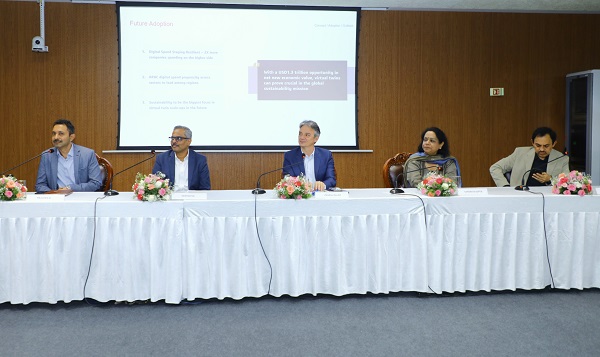Chandigarh, 17 June, 2024 — Dassault Systèmes (Euronext Paris: FR0014003TT8, DSY.PA) and nasscom today released a report on the adoption and impact of virtual twin technology. The report reveals a twofold increase in virtual twin implementations post-pandemic. Virtual twin adoption in India could play a crucial role in accelerating the design-to-realization process, helping organizations achieve their sustainability and circularity goals across the value chain.
Here are the key findings for India:
Digital and Process Maturity
· 57% of Indian enterprises allocate less than 30% of technology spending to digital spend
· Over 50% of the enterprises also indicate patchy digitalization, with only the key functions digitalized, but in silos, thereby limiting effective ROI realization
· Less than 1-in-5 companies have put in place advanced process automation; the majority have implemented Retrofitted Process Automation (RPA)
Virtual Twin Budgets and Scale
· 25% of the companies do not have formal budgets for virtual twins
· 80% of the companies have less than 7% of tech spend allocated to virtual twin adoption
· 63% of Indian companies deploy virtual twins at the product or process level. 40% of those companies are at the product level in using virtual twins, 23% at the process level. Precision in product-market fit came as one of the top three objectives for implementing virtual twins.
Deployment Time
· 75% of virtual twin implementations in India take between 12-24 months of deployment time at each level of product, process, or system virtual twin
Primary Business Objectives
· Precision in product market fit
· Manufacturing process efficiencies
· Remote maintenance and worker safety
Supplier Strategy
· 75% of Indian enterprises cite supplier selection as a major challenge
· 50% are evaluating suppliers
Tech Readiness
· 70% of Indian firms indicate that across software, IT-OT hardware, and connectivity tech, they are still in the PoC/pilot stages
· Analytics and AI/ML applications are some of the least productionized, after high-definition 3D software and other specialist applications
· 67% of enterprises seek either best-of-breed software packages or partner with large managed service providers for their virtual twin applications
This report is based on a survey of 130 companies in India as well as across Europe and APAC, focusing on large and mid-sized enterprises with annual recurring revenue (ARR) of $500 million and above. The survey spans four major industry segments: continuous manufacturing, discrete manufacturing, public infrastructure and smart cities, and life sciences and healthcare.
“Virtual twin technology is poised at the brink of transformative potential, marked by a sharp increase in awareness and early adoptions since the pandemic. Although full-scale implementations and dedicated budgets remain limited, the focus on optimizing assets and processes opens up expansive opportunities. Overcoming hurdles in software procurement, enhancing top-level commitment and ecosystem synergies can unlock groundbreaking innovations, driving industries toward a more efficient and digitally integrated future,” said Sangeeta Gupta, Senior Vice President & Chief Strategy Officer at nasscom.
“With our latest report on virtual twin technology impact and adoption in collaboration with nasscom, we are encouraged by the significant growth in adoption and the emergence of industry-specific use cases. Our report underscores the imperative for organizations to secure top leadership commitment and navigate software procurement challenges to achieve production-grade capabilities. We remain committed to empowering businesses in their journey towards enhanced performance and operational efficiency through virtual twin technology, driving sustainable growth and innovation across industries,” said Deepak NG, Managing Director, India, Dassault Systèmes.
Disclaimer
The information contained in this website is for general information purposes only. The information is provided by TodayIndia.news and while we endeavour to keep the information up to date and correct, we make no representations or warranties of any kind, express or implied, about the completeness, accuracy, reliability, suitability or availability with respect to the website or the information, products, services, or related graphics contained on the website for any purpose. Any reliance you place on such information is therefore strictly at your own risk.
In no event will we be liable for any loss or damage including without limitation, indirect or consequential loss or damage, or any loss or damage whatsoever arising from loss of data or profits arising out of, or in connection with, the use of this website.
Through this website you are able to link to other websites which are not under the control of TodayIndia.news We have no control over the nature, content and availability of those sites. The inclusion of any links does not necessarily imply a recommendation or endorse the views expressed within them.
Every effort is made to keep the website up and running smoothly. However, TodayIndia.news takes no responsibility for, and will not be liable for, the website being temporarily unavailable due to technical issues beyond our control.
For any legal details or query please visit original source link given with news or click on Go to Source.
Our translation service aims to offer the most accurate translation possible and we rarely experience any issues with news post. However, as the translation is carried out by third part tool there is a possibility for error to cause the occasional inaccuracy. We therefore require you to accept this disclaimer before confirming any translation news with us.
If you are not willing to accept this disclaimer then we recommend reading news post in its original language.













